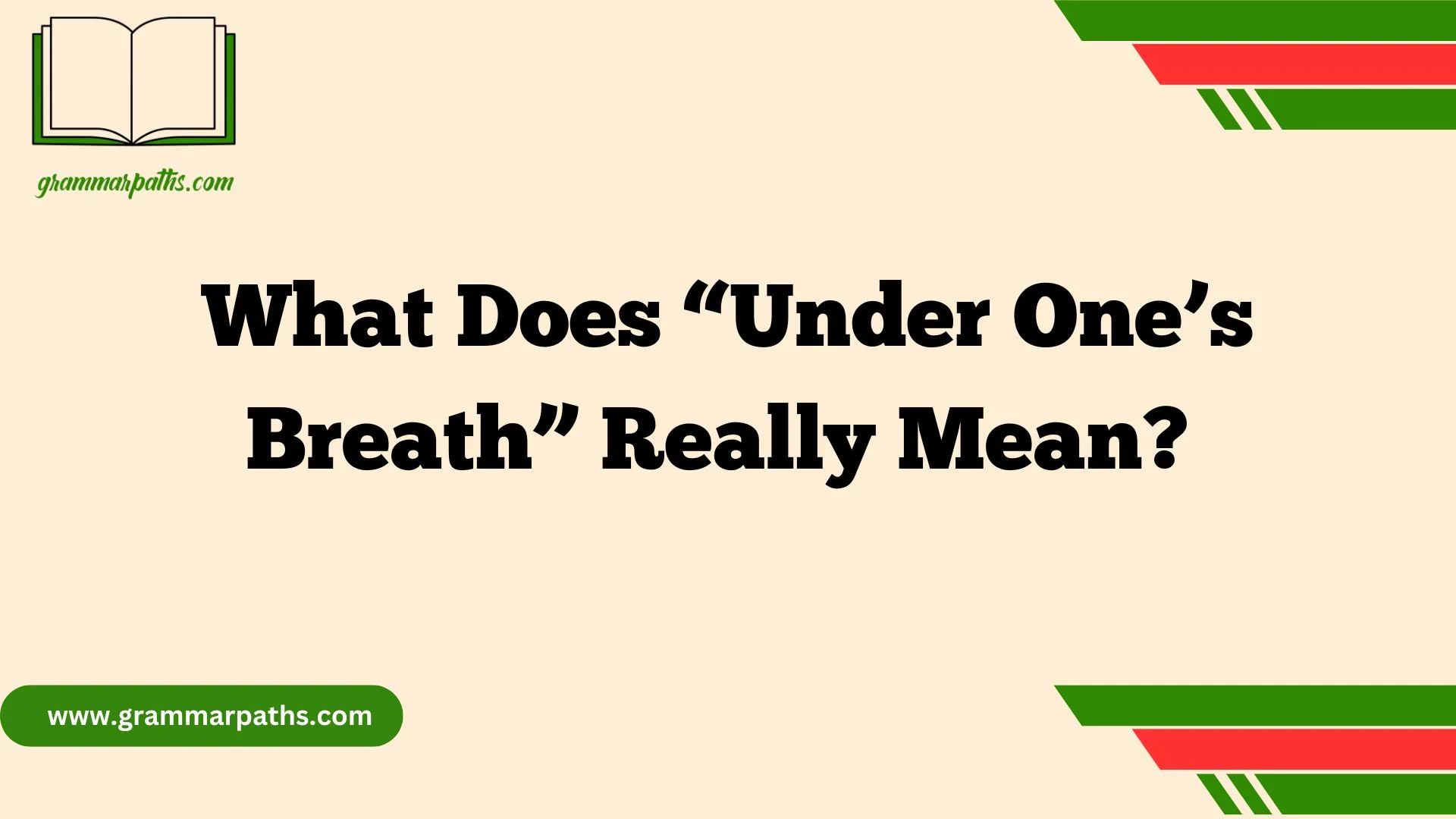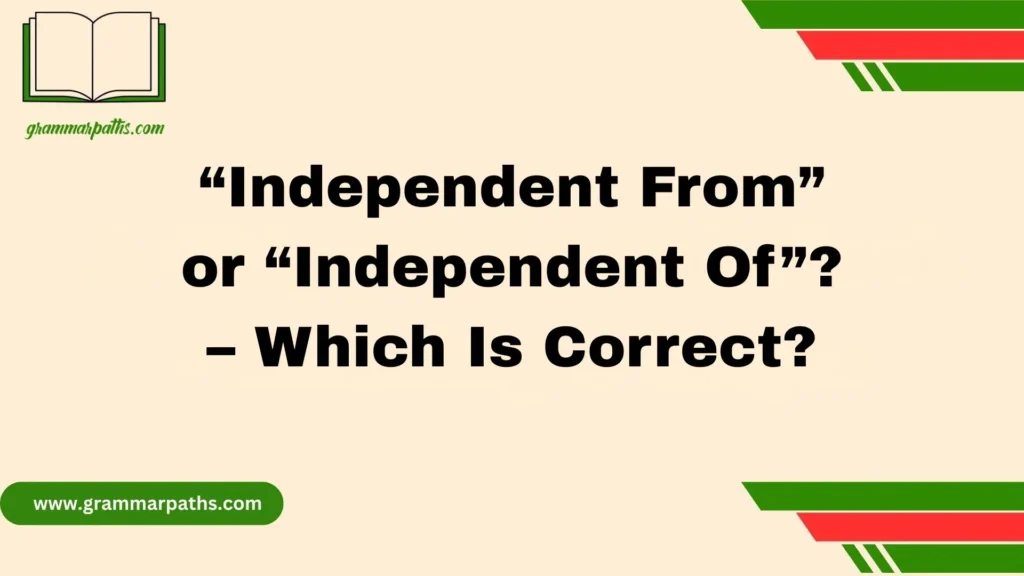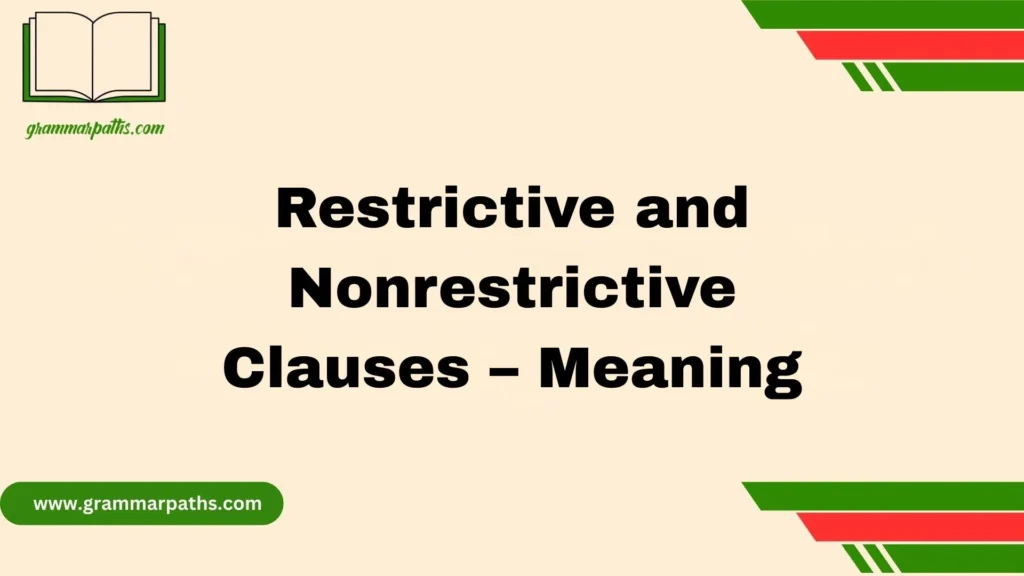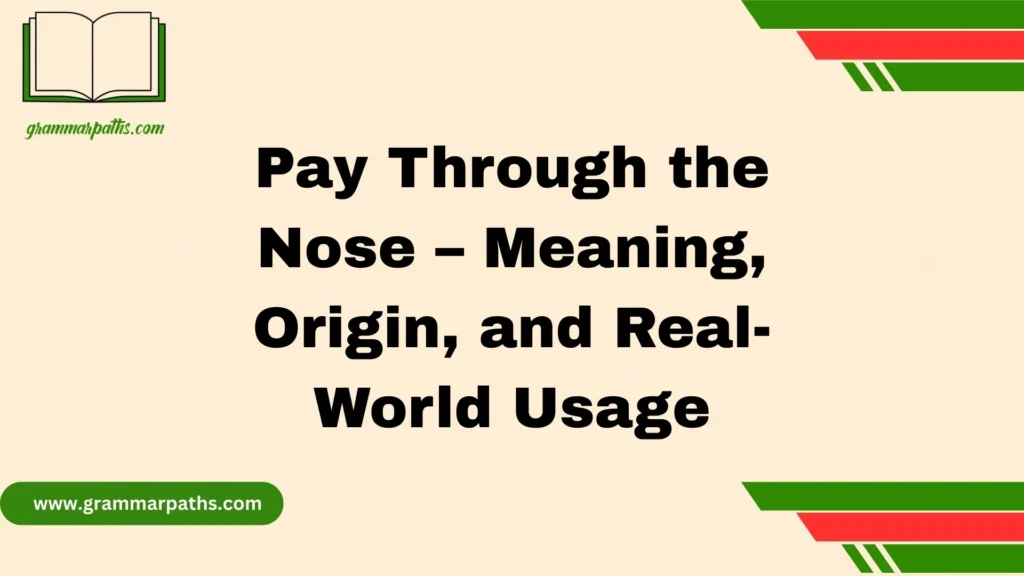When someone speaks “under one’s breath,” they are saying something in a low voice, often muttering, mumbling, or grumbling so that it’s barely audible to others. This phrase is typically used to describe whispered speech, especially when someone is expressing anger, sarcasm, or criticism without wanting others to clearly hear. It’s a form of non-verbal communication meant to hide true emotions while still letting them out. Saying something under your breath often carries emotional weight—think of someone muttering quietly when frustrated or speaking softly during a disagreement. People commonly search this idiom to understand its tone, context, and appropriate usage in daily conversation or writing.
Understanding the meaning of “under one’s breath” helps us decode subtle communication cues, especially in informal conversations or tense moments. Whether it’s a sarcastic comment, a silent complaint, or a private remark, this idiom reveals how low-volume speaking can still carry powerful messages. In English language learning, idioms like these are essential to mastering the emotional depth and cultural richness of the language. Users also want to know how “under one’s breath” compares to whispering, what synonyms exist like murmur or talk in hushed tones, and when it’s appropriate or rude to use. From its subtle tone to its everyday application, this phrase invites deeper exploration into how we express quietly what we might not say out loud.
What Does “Under One’s Breath” Really Mean?
To speak “under one’s breath” means to say something in a quiet voice that’s not meant to be clearly heard—often expressing displeasure, sarcasm, resentment, or even a personal thought one would rather not announce. It’s not quite a whisper and not loud enough to be public. The tone often reveals more than the words themselves.
Key Characteristics:
- Low volume: Deliberately subdued to avoid being heard.
- Intentional secrecy: Often used to express thoughts indirectly.
- Emotional undertone: Carries irritation, mockery, fear, or rebellion.
Quick Examples:
- “Sure, I’ll totally do all your work,” she muttered under her breath.
- He grumbled under his breath when asked to stay late—again.
This idiom sits at the intersection of subtlety and subversion, making it powerful in conversation and storytelling alike.
The Origins of the Idiom “Under One’s Breath”
The idiom first appeared in English in the early 19th century, but the concept of muttering privately or secretively predates it by centuries. Human communication has always included levels—public, private, whispered—and the need to withhold while still expressing is timeless.
Historical Roots:
- The earliest written example of “under one’s breath” was recorded in 1832, appearing in political commentary in British parliamentary records.
- It gained popularity in the Victorian era, where public decorum often demanded restraint, making discreet speech a social tool.
Cultural Influence:
- In British society, where class and politeness governed behavior, speaking softly allowed individuals to express rebellion without overt conflict.
- The idiom entered American English soon after, fueled by fiction writers like Mark Twain, who used it to show irony and sarcasm.
“She said it under her breath, as if the words themselves might get her in trouble.” — Louisa May Alcott, 1869
Real-Life Examples of “Under One’s Breath”
We’ve all been there—saying something we hope won’t be heard, or saying it just enough to be noticed. Let’s look at how this idiom plays out in everyday life.
Common Situations:
- Workplace: An employee mutters criticism during a team meeting.
- Parenting: A teen responds to a rule with a barely audible, sarcastic comment.
- Friendships: Quiet remarks about someone’s outfit or behavior, just loud enough for one person to catch.
Body Language That Accompanies It:
| Behavior | Meaning |
| Downward gaze | Hiding emotion or frustration |
| Half-smile or smirk | Indicates sarcasm or passive defiance |
| Turned shoulder | Physical attempt to limit others from hearing |
| Quick speech pace | Hopes the words pass unnoticed |
Subtext:
What’s said under one’s breath often carries more weight than what’s said aloud, because it represents unfiltered thought.
“Under One’s Breath” in Literature and Popular Media
Writers, screenwriters, and playwrights have long used this idiom to convey passive conflict, unspoken emotion, and internal monologue. It’s a tool to express what a character feels but can’t fully voice.
Examples in Literature:
- Charles Dickens often used it in characters burdened by class inequality or servitude.
- Jane Austen’s heroines used quiet remarks to challenge social expectations.
- In modern fiction, the idiom reveals layers of emotion or social power struggles.
“He cursed under his breath, for the truth had escaped him before he was ready.” — Contemporary Novel Usage
Examples in Film & TV:
- “The Office” (US): Characters often mutter “under their breath” during awkward moments.
- “Breaking Bad”: Walter White’s low-toned threats add tension.
- Disney movies: Sidekicks often speak “under their breath” for humor or rebellion.
Cultural Equivalents Around the World
Different languages and cultures have their own versions of this idiom—proving that the urge to say things secretly or subtly is global.
Table: Global Equivalents of “Under One’s Breath”
| Language | Idiom or Phrase | Literal Meaning | Common Use |
| French | “Parler entre ses dents” | Speak between one’s teeth | Used for whispering criticism |
| Japanese | “小声で言う (Kogoe de iu)” | Say in a small voice | Used for secretive speech |
| Spanish | “Decir en voz baja” | Say in a low voice | Used for personal remarks |
| Urdu | “دبے الفاظ میں کہنا” | Speak in muffled words | Used for veiled expressions |
| German | “Etwas unter dem Atem sagen” | Say something under breath | Used for quiet discontent |
Cultural Insight:
In many Eastern cultures, speaking softly is a sign of politeness, whereas in the West, it often indicates resistance or sarcasm. This idiom’s meaning shifts subtly depending on social expectations.
When Speaking “Under One’s Breath” Crosses a Line
Although it can be a harmless coping mechanism, speaking under your breath can carry consequences—especially when context and tone aren’t well received.
Where It Can Go Wrong:
- Workplace: Undermines authority or team unity
- Classroom: Viewed as disrespectful or dismissive
- Courtroom or legal settings: Can be construed as contempt
Case Study:
In 2023, during a high-profile trial in New York, a lawyer was admonished for speaking under his breath after a judge’s ruling. The comment, although quiet, was caught by microphones and labeled “unprofessional conduct.”
Social Perception:
- Often seen as passive-aggressive
- Can be mistaken for cowardice or sarcasm
- May trigger misunderstandings or conflict escalation
How to Use the Idiom Correctly (and When Not To)
To master the phrase, one must use it naturally, understand its emotional context, and avoid overusing it in formal settings.
Best Practices:
- Use in informal speech or narrative writing
- Pair with dialogue to reflect emotional undertones
- Avoid in legal, academic, or high-stakes communication
Grammar Tips:
Correct:
- He said it under his breath before walking away.
Incorrect:
- He said under his breath it before walking away.
Avoid Confusion With:
- Whispering = typically intentional and for someone to hear
- Mumbling = unclear speech, not necessarily secret
- Muttering = low, grumpy tone without clear audience
Idioms and Phrases Related to “Under One’s Breath”
Understanding similar expressions helps highlight how and when this idiom is distinct.
Related Expressions:
| Idiom | Meaning | Key Difference |
| Bite one’s tongue | Refrain from speaking | Active silence |
| Behind someone’s back | Speak about someone in their absence | Not necessarily quietly |
| Speak in hushed tones | Speak softly out of respect or secrecy | More neutral than sarcastic |
| Mutter or mumble | Speak unclearly | May be accidental or unintentional |
Expression Nuances:
While “under one’s breath” implies a passive or resistant edge, phrases like “speak in hushed tones” suggest respect or discretion.
The Psychology Behind Quiet Speech and Passive Expression
Why do people speak under their breath? Psychologists suggest it’s often a defense mechanism. When direct confrontation feels risky, whispering or muttering helps release emotion with less perceived consequence.
Psychological Drivers:
- Fear of conflict
- Desire to be heard without facing backlash
- Expression of suppressed feelings
- Social power dynamics
“People speak under their breath to voice opinions they’re afraid to own.” — Dr. Emily Kern, Behavioral Linguist
Connection to Personality:
- Introverts may use it to avoid center-stage conflict
- Passive-aggressive personalities often rely on it to express resentment indirectly
Why “Under One’s Breath” Still Matters in the Digital Age
In a world of tweets, DMs, and subtweets, the modern version of “speaking under one’s breath” is digital indirectness. It shows up when people want to make a point—without directly naming names.
Modern Equivalents:
- Subtweeting: Posting on social media with veiled criticism
- Side-eye emojis + vague captions: Quiet signaling
- Muted Zoom muttering: Not realizing you’re unmuted, oops!
Relevance Today:
Despite new platforms, the need to voice subtle opposition or emotion remains timeless. Whether online or offline, people still choose indirect expression over confrontation.
Common Misconceptions and FAQs
Here are some frequent misunderstandings about “under one’s breath”:
Myth-Busting:
- It’s always rude – No. It can be humorous, ironic, or even affectionate.
- It means whispering – Not exactly. A whisper is clearer and usually meant to be heard.
- It’s outdated – Definitely not. It’s just evolved into new forms.
Quick Reference Table: Everything You Need to Know
| Feature | Insight |
| Definition | Saying something quietly to avoid being heard |
| First Usage | Early 1830s in British literature |
| Emotional Context | Sarcasm, frustration, secrecy, subtlety |
| Cultural Reach | Exists in most languages, globally recognized |
| Common Mistake | Confusing it with whispering or mumbling |
| Modern Equivalent | Subtweeting, digital ambiguity |
FAQs:
1. What does the idiom under one’s breath mean?
“Under one’s breath” means speaking very quietly or in a whisper, often so others can’t hear. It’s usually used when someone is muttering or expressing hidden thoughts or frustration.
2. What does the phrase “under your breath” mean?
It means saying something softly or secretly, not intended for everyone to hear. Often used when people speak in annoyance, sarcasm, or private emotion.
3. What does it mean when someone says something under their breath?
It means they are speaking quietly and privately, often to themselves or to avoid being overheard. It may show disapproval, complaint, or sarcasm.
4. What does beneath one’s breath mean?
This is a variation of the same idiom—“beneath one’s breath” also means speaking in a low tone. It’s less common but still implies whispering or muttering quietly.
5. What is another word for talking under your breath?
Synonyms include: muttering, murmuring, whispering, mumbling, or grumbling. All suggest soft, often unclear or private speech.
Final Thoughts: The Enduring Power of What’s Left Unsaid
The phrase “under one’s breath” may seem simple, but it carries a world of nuance in communication. Whether it’s a mutter of frustration, a low-voiced joke, or a quiet complaint, this idiom reveals how we often express ourselves without speaking out loud. By understanding its meaning, you gain insight into non-verbal cues, tone, and the emotional subtext of conversations. It’s not just about volume—it’s about intention, and how subtle speech can still speak volumes.
So the next time someone mumbles something softly, recognize the power behind those unspoken words. From grumbling under breath to speaking in hushed tones, these expressions allow us to navigate sensitive situations, show discontent, or hide true feelings. Learning idioms like this not only improves your English fluency, but also helps you connect more deeply with how people communicate in real life. Sometimes, the quietest words are the loudest in meaning.

Mia Rose is the passionate writer and founder of GrammarPaths.com, a resource dedicated to helping learners master English grammar, idioms, and writing skills with ease. With a deep love for language and years of experience in teaching and content creation, Mia simplifies complex grammar rules into clear, practical guides that readers can instantly apply.












